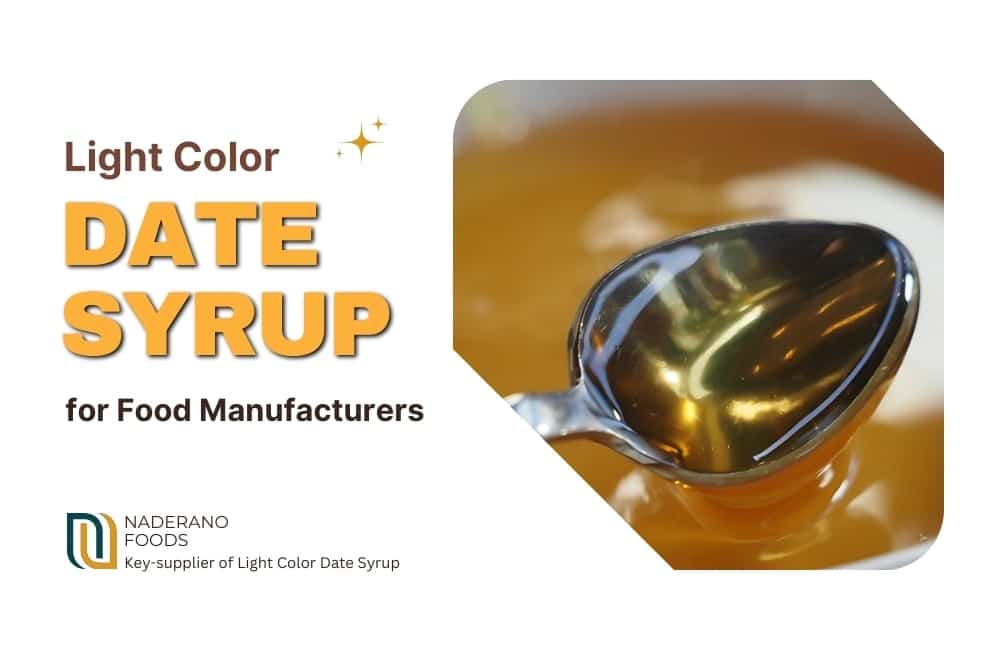In today’s health-conscious market, food and beverage manufacturers worldwide are seeking alternatives to refined sugar that offer more than just empty calories. Naderano Foods, a B2B exporter and supplier of light color date syrup, has witnessed this rising demand firsthand.
Light color date syrup – sometimes called “date liquid sugar” or “date honey” – is a natural sweetener made from pure dates, valued for its mild flavor and rich nutritional profile. It’s becoming a go-to ingredient for clean-label formulations and functional foods, helping brands meet consumer expectations for healthier, nutrient-rich sweeteners. As a leading light color date syrup supplier for food manufacturers, we explore why this golden syrup is gaining popularity and how it can elevate your products in 2024–2025.
Rising Demand for Nutrient-Rich Sweeteners in Food Manufacturing
Manufacturers are responding to strong consumer demand for healthier sweeteners that align with wellness trends. Shoppers today carefully read ingredient lists and nutrition labels, looking for natural ingredients and “no added sugar” claims. In fact, reduced sugar and clean-label claims are among the top factors influencing purchase decisions. Global health policies like sugar taxes in regions such as Europe have also pushed brands toward low-sugar and natural alternatives. As consumers become increasingly wary of high sugar intake, many companies are formulating new products with zero or reduced added sugars, often by using natural sweetening agents.
Within this context, date syrup has emerged as a promising solution. A recent industry report notes that the date syrup market is growing robustly due to “increasing demand for natural sweeteners, increased health consciousness, and the shift from white sugars”. Unlike artificial sweeteners or heavily processed corn syrups, date syrup is plant-based and unrefined, appealing to consumers seeking wholesome, plant-derived ingredients. The rise of vegan, gluten-free, and clean-label food culture further boosts interest in fruit-based sweeteners like date syrup. Manufacturers in categories from beverages to bakery are exploring date syrup to deliver sweetness along with nutritional value – a key strategy as we head into 2025’s focus on healthier, functional foods.
What Is Light Color Date Syrup and Why It Matters
“Light color” date syrup refers to a filtered, decolorized form of date syrup that has a light golden hue and neutral taste. It is made 100% from dates but undergoes special filtration to remove much of the dark color and strong caramel-like flavor of traditional date molasses. The result is a clear, light-brown syrup (often called date liquid sugar) that delivers sweetness without significantly altering the color or flavor of your product. This matters greatly for formulators – you get all the natural goodness of dates in an odorless, mild-tasting syrup that can seamlessly replace corn syrup, refined sugar, or honey in recipes. In fact, light color date syrup is sometimes described as the “cheapest natural liquid sweetener” because it provides neutral sweetness and all the nutritive value of dates at a competitive cost.
From a supplier’s perspective, ensuring a light, consistent color involves advanced refining techniques. Naderano Foods, for example, produces a premium light color date syrup at ~72°Brix with a clear light-yellow appearance. No additives or artificial decolorants are used, it’s simply the purity of high-quality dates shining through. The advantage for food manufacturers is a versatile sweetener that can be used in products where a dark syrup might be visually or flavor-wise unsuitable (such as delicate beverages, golden-brown baked goods, or light-colored sauces). With light date syrup, product developers can achieve the desired sweetness and clean-label appeal without the heavy taste or color of traditional date molasses.
Key Nutrients in Light Color Date Syrup
One of the biggest reasons date syrup stands out is its rich nutritional profile. Unlike refined sugar or glucose syrup – which deliver calories with virtually no nutrients – date syrup retains many of the vitamins and minerals from whole dates. Each tablespoon of date syrup provides trace minerals and antioxidants that can support health. For example, date syrup contains meaningful amounts of potassium, magnesium, iron, and calcium, nutrients crucial for bodily functions like heart health, muscle function, and blood production. In fact, one industry analysis highlights that date syrup offers more potassium, magnesium, iron, and phosphorus than honey or maple syrup, underscoring its nutrient density. Just a single tablespoon can supply roughly 3% of an adult’s daily potassium needs, along with small amounts of calcium and magnesium.
Beyond minerals, date syrup also provides vitamins (like B vitamins) and even a bit of dietary fiber and amino acids. The fiber content in date syrup is minimal compared to whole dates (especially in highly filtered light syrup), but even a small amount is more than what’s found in honey or refined syrups (which have zero fiber). This means date syrup isn’t just an empty sugar, it contributes to daily nutrient intake in a way standard table sugar does not. It’s also rich in natural antioxidants: research has shown date syrup to have an exceptionally high antioxidant capacity (ORAC value ~6500), even higher than the famed antioxidants in red wine. These antioxidant compounds (such as phenolics from the dates) may help neutralize free radicals, adding a functional food aspect to the sweetener.
Another benefit is the glycemic index (GI) of date syrup. Because it consists largely of glucose and fructose from fruit (with very low sucrose content), date syrup has a lower GI than pure glucose or many refined sugars. Its GI is around 62, which is significantly lower than the GI of honey (~87) or high-glucose corn syrup. A lower GI indicates a slower release of sugar into the bloodstream, providing more stable energy and fewer spikes and crashes. While date syrup is still a source of sugars and should be consumed in moderation, this modestly lower glycemic response can be an advantage for maintaining steady energy levels. Combined with its micronutrients and natural sweetness, these qualities have led experts to call date syrup a “healthier alternative” to empty-calorie sweeteners. It delivers the sweet taste consumers crave along with bonus nutrients and potentially gentler effects on blood sugar.
Light Color Date Syrup vs. Refined Sugar and Corn Syrup
When comparing date syrup to conventional sweeteners like refined cane sugar or glucose syrup, the phrase “empty calories” often comes up for the latter. Refined sugar (sucrose) and corn-derived syrups provide sweetness but nothing else – no vitamins, no minerals, no fiber. In contrast, date syrup offers a more holistic nutritional profile, as discussed above. This difference can have tangible benefits in product development and marketing.
For instance, consider the role of fiber and micronutrients: even though sugar is metabolized similarly in the body regardless of source, having accompanying nutrients can aid in better metabolism and utilization of those sugars. As one clean-eating advocate explained, at the molecular level a sugar from corn syrup isn’t much different from a sugar from dates, but “the date is still the better choice as it contains more vitamins, minerals, and added fiber for extra nutrition, nutrient absorption, and blood sugar regulation”. In other words, date syrup gives formulators a way to sweeten recipes while contributing to the nutritional value of the product – something refined sweeteners simply cannot do.
From a functional standpoint, light color date syrup can often replace corn syrup or invert sugar syrup one-to-one in recipes, providing similar sweetness and viscosity. It dissolves well and has a similar consistency to honey or glucose syrup, making it easy to blend into beverages, batters, or sauces. What’s notable is that it’s a natural invert sugar with a high percentage of fructose and glucose and very little sucrose. This composition not only influences the GI (as mentioned) but also means it remains liquid and resists crystallization (a property valued in confectionery and drinks). Manufacturers get the technical benefits of a liquid sweetener along with a marketing edge: the ingredient can be listed simply as “date syrup” or “date concentrate” – a recognizable, single ingredient rather than a chemically-sounding additive. In the era of clean labels, having fruit-based terms on the ingredient list is a big plus.
Moreover, date syrup aligns with various dietary needs and ethical preferences. It is naturally vegan (plant-based) and free of common allergens. Unlike honey (which some consumers avoid due to vegan lifestyle or allergy concerns), date syrup is 100% derived from fruit and involves no animal products. It’s also non-GMO and gluten-free by nature, with many suppliers (like Naderano Foods) able to provide organic-certified syrup. This broad compatibility means manufacturers can use date syrup in products aimed at a wide audience, including those looking for plant-based or all-natural labels. Ultimately, replacing refined sugar or corn syrup with date syrup can transform a product’s nutritional story – turning a candy bar or beverage from simply sweet to sweet and nourishing. It’s a strategic move for brands positioning their offerings as better-for-you alternatives to the status quo.
Why Manufacturers Choose Light Date Syrup
From infant nutrition to sports beverages, food manufacturers are increasingly turning to light color date syrup as a key ingredient. The trend is evident across multiple segments:
- Baby Foods and Toddler Snacks: Perhaps one of the biggest drivers is the push to eliminate refined sugar in foods for young children. Health guidelines now recommend no added sugars for infants under 2 years, and parents are scrutinizing labels like never before. Date syrup provides a natural sweetness that can be used in baby cereals, fruit purees, and snack bars without resorting to white sugar. In fact, industry analysts see “gigantic potential” for clean-label date syrup products in the infant and toddler nutrition space, as parents actively steer clear of added sugars. A baby biscuit or applesauce sweetened with a touch of date syrup can claim no refined sugar (though still naturally sweet), aligning with what modern parents expect. Additionally, the extra nutrients in date syrup (like potassium and magnesium) are appealing for developing bodies. Brands can highlight that their baby food is sweetened with fruit – a compelling point for marketing and trust-building.
- Beverages and Drinks: Natural sweeteners are shaking up the drink industry as well. Light color date syrup dissolves easily, making it suitable for beverages from smoothies and juices to energy drinks and herbal teas. Manufacturers of functional drinks love that date syrup brings along antioxidants and trace minerals – it fits perfectly in products marketed for wellness or immunity. In some regions like Asia, date syrup is even used in Ayurvedic drinks and immunity-boosting tonics as a functional sweetener. For mainstream beverages, using date syrup instead of high-fructose corn syrup or artificial sweeteners can significantly improve the label perception. For example, an iced tea or a sports drink formulated with date syrup can avoid the negative connotations of HFCS while adding the cachet of a fruit-based ingredient. It also supports sugar reduction strategies; while the total sugars might be similar, the product can differentiate itself by its source of sweetness (and possibly use slightly less thanks to date syrup’s rich flavor profile). With 72% of consumers trying to limit sugar, beverages that use natural sweeteners like date syrup are well-positioned to win favor.
- Snack Bars and Baked Goods: Many energy bars, granola bars, and protein bites now tout dates or date syrup as a primary ingredient. There’s a reason for this popularity in bars: date syrup (and date paste) not only sweeten naturally, but also act as a binder and moisture-retainer, thanks to their syrupy consistency. Bars made with date syrup can boast “no refined sugar” and get an extra fiber or potassium boost, making them ideal for the health-conscious consumer or athlete. In North America, the demand is high – date syrup is increasingly utilized in plant-based nutrition bars and breakfast foods. Bakers are also experimenting with date syrup in muffins, breads, and pastries to replace part of the cane sugar. The light color variant is especially useful for keeping the appearance of breads and cakes attractive (for instance, a golden-brown granola bar instead of a dark brown one). Additionally, clean-label bakery is a growing trend: using date syrup aligns with natural ingredients and can contribute to a softer texture and longer shelf life (due to its humectant properties).
- Dairy Alternatives and Sauces: Beyond sweet snacks, light color date syrup has found its way into plant-based dairy products (like almond milk yogurts or oat milk creamers) and savory-sweet sauces. It is used in some dairy alternative products for subtle sweetness and as a way to avoid cane sugar. In sauces or dressings (think a tangy barbecue sauce or a balsamic-date glaze), date syrup’s natural caramel notes can enhance flavor while cutting down on refined sugars. Its light color version is especially handy in products like ketchup, mustard, or clear beverages where a dark color would be off-putting.
The regulatory and consumer landscape also favors the inclusion of date syrup. Clean eating movements and even government regulations are creating an environment where natural sources of sweetness are preferred. For example, some countries have implemented taxes on sugary drinks or strict labeling laws for high sugar content, prompting manufacturers to reformulate with alternatives like fruit syrups. Using date syrup can help brands both meet these regulations (by reducing total added sugars in some cases) and craft a friendlier image. Consumers have shown they’re willing to pay a premium for products with added health benefits and recognizable ingredients. By using date syrup, companies can legitimately market nutrition claims or at least highlight the presence of intrinsic nutrients. For instance, a beverage could mention it’s “sweetened with date syrup, a source of potassium and antioxidants,” which resonates with shoppers looking for functional benefits in their drinks.
Lastly, date syrup supports the growing trend of sustainability and authenticity. It is often sourced from date palm groves in the Middle East or North Africa – regions with rich agricultural heritage. A supplier like Naderano Foods ensures that the syrup is produced with minimal processing and often as a byproduct of date farming (making use of dates that might otherwise go to waste). This story can be part of a brand’s narrative: a natural sweetener with a smaller environmental footprint and a connection to ancient food traditions (dates have been used as a sweetener for thousands of years). All these factors combined explain why so many food manufacturers – from global brands to innovative startups – are embracing date syrup in their product lines. It checks the boxes for health, taste, and label appeal that define the 2024–2025 food industry trends.
Trusted Light Color Date Syrup Supplier for Your Next Product
As the demand for nutrient-rich, clean-label sweeteners grows, having a reliable light color date syrup supplier is crucial for food and beverage manufacturers. Working with an experienced exporter like Naderano Foods means you get quality, consistency, and expert support in using this unique ingredient. We source the finest dates and produce light color date syrup to international standards, ensuring a consistent light hue, optimal sweetness, and rich nutritional content in every batch. For B2B buyers, we offer flexible bulk packaging options – from 25 kg pails to 250 kg drums on plastic pallets – to suit your manufacturing needs. We understand that every product is different, so whether you need a specific Brix level or private label packaging, we can accommodate those requirements (just as we’ve done for clients across the globe).
Most importantly, choosing the right supplier gives you peace of mind on food safety and supply chain reliability. At Naderano, our facilities adhere to strict food safety protocols, and all our date syrup is free from additives and preservatives (nothing but pure date extract). We can provide relevant documentation and certificates upon request, so you can confidently integrate our syrup into baby foods, organic products, or any application with high quality standards. Our logistics team also ensures smooth global shipping, so whether your factory is in Europe, North America, or Asia, you’ll receive fresh date syrup ready to sweeten your formulations.
Conclusion: Light color date syrup is more than a sweetener – it’s a strategic ingredient for modern food manufacturing. By offering natural sugars alongside fiber, minerals, and antioxidants, it helps product developers meet the dual goals of health and flavor. It aligns perfectly with clean-label trends, sugar reduction initiatives, and the growing consumer expectation for functional benefits in everyday foods. If you’re formulating the next organic energy bar, a low-sugar beverage, or an all-natural baby food, consider the advantages of this golden date nectar. Naderano Foods is here to support your innovation as a dedicated light color date syrup supplier.
Contact us today to request a sample or get a quote for bulk orders, and let’s work together to create healthier, sweeter successes for your brand.
LEAVE US A MESSAGE ON WHATSAPP


